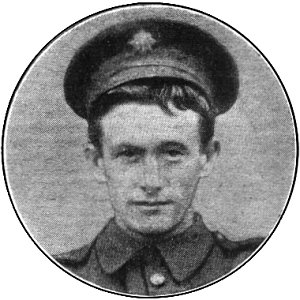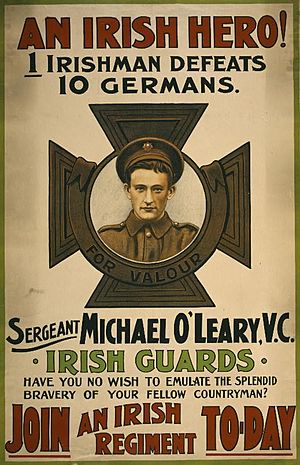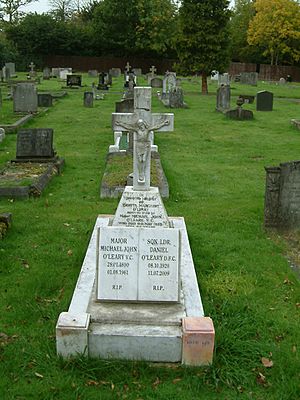Michael John O'Leary facts for kids
Quick facts for kids
Michael John O'Leary
|
|
|---|---|
 |
|
| Born | 29 September 1890 Macroom, County Cork |
| Died | 1 August 1961 (aged 70) Islington, London |
| Allegiance | |
| Service/ |
|
| Years of service | 1906 – 1910 (Royal Navy) 1910 – 1913, 1914 – 1921, 1939 – 1945 (British Army) |
| Rank | Major |
| Unit | Irish Guards Connaught Rangers Middlesex Regiment |
| Battles/wars | World War I World War II |
| Awards | Victoria Cross Mentioned in Despatches Cross of St. George |
Michael John O'Leary (born September 29, 1890 – died August 2, 1961) was a brave Irish soldier and police officer. He is famous for receiving the Victoria Cross, which is the highest award for bravery in battle for British and Commonwealth soldiers. O'Leary earned this award during World War I by bravely attacking and destroying two German machine gun positions all by himself. This amazing act happened near a French village called Cuinchy.
Before his heroic act, O'Leary had already served nine years in the British Armed Forces. He continued to serve in the British Army until 1921, reaching the rank of lieutenant. He also served again during World War II. When he finally retired from the military in 1945, he was a Major in charge of a prisoner-of-war camp. Between the two wars, O'Leary worked as a police officer in Canada. After World War II, he became a building contractor in London, where he passed away in 1961.
Early Life and First Jobs
Michael O'Leary was born in 1890 in County Cork, Ireland. He was one of four children. His family owned a farm. When he was 16, Michael decided he didn't want to work on the farm anymore.
He joined the Royal Navy first. He served for several years until knee problems made him leave. After a few months, he joined the Irish Guards regiment of the British Army.
In 1913, O'Leary left the Irish Guards to become a police officer in Canada. He joined the Royal North-West Mounted Police (RNWMP) in Saskatchewan. He was praised for his courage when he captured two criminals after a long gunfight. When World War I started in August 1914, O'Leary got permission to leave the police. He returned to Britain to rejoin the army. By November, he was in France with his regiment, fighting in Flanders.
World War I Hero
In December 1914, O'Leary was involved in heavy fighting. He was mentioned in official reports for his bravery and was promoted to lance corporal in January 1915.
Just a few weeks later, on February 1, 1915, the Irish Guards were planning an attack on German positions near Cuinchy. However, the Germans attacked first. They captured an important area called the Hollow. This area was key because it protected a tunnel under a railway.
The Irish Guards were ordered to help retake the position. The first attack faced heavy machine gun fire, and many soldiers, including all the officers, were killed or wounded.
Second Lieutenant Innes then led a second attack. The soldiers were struggling under heavy fire from a German machine gun.
O'Leary, who was helping Innes, bravely charged forward. He ran towards the first German machine gun position on top of the railway bank. He fired five shots, killing the soldiers operating the gun.
He didn't stop there! O'Leary kept going towards a second German machine gun, about 60 yards away. He climbed the railway bank again to avoid the muddy ground. The Germans saw him coming, but he was too fast. He opened fire, killing three more soldiers and capturing two others after he ran out of ammunition.
O'Leary's incredible actions disabled both German machine guns. This allowed the British soldiers to recapture their position. He then returned to his unit with his prisoners, looking completely calm.
For his amazing bravery, O'Leary was quickly promoted to sergeant on February 4. He was also recommended for the Victoria Cross. The award was officially announced on February 16, 1915:
No. 3556 Lance-Corporal Michael O'Leary, 1st Battalion, Irish Guards
For conspicuous bravery at Cuinchy on the 1st February, 1915. When forming one of the storming party which advanced against the enemy's barricades he rushed to the front and himself killed five Germans who were holding the first barricade, after which he attacked a second barricade, about 60 yards further on, which he captured, after killing three of the enemy and making prisoners of two more. Lance-Corporal O'Leary thus practically captured the enemy's position by himself and prevented the attacking party from being fired upon.
The London Gazette, 16 February 1915
After the Victoria Cross
O'Leary returned to Britain to receive his medal from King George V at Buckingham Palace in June 1915. He received a huge welcome in Hyde Park, with thousands of people cheering for him. He became a national hero. Writers like Sir Arthur Conan Doyle praised his bravery. When he visited his hometown of Macroom in Ireland, crowds also came out to celebrate him.
He was further honored by being promoted to a commissioned officer, becoming a second lieutenant with the Connaught Rangers. He also received a Russian award, the Cross of St. George.
In 1916, O'Leary went to Salonika to serve in the Balkans campaign. He stayed there until the war ended. During his service in the Balkans, he caught malaria, which affected his health for the rest of his life.
Life After the Wars
After World War I, O'Leary returned to Canada in 1921. He planned to rejoin the police, but it didn't work out. He gave lectures about his war service and then joined the Ontario Provincial Police. He worked to enforce prohibition laws. Later, he became a police sergeant for a railway company.
In 1925, O'Leary faced some difficulties in his police career. He eventually returned to Ireland with his family.
His health began to decline. The British Legion helped him return to Britain and find work. By 1932, he was working at The May Fair Hotel in London. He also helped with charity events for wounded soldiers.
When World War II began in 1939, O'Leary rejoined the military as a captain in the Middlesex Regiment. He went to France but had to return to Britain before the Battle of France because his malaria returned.
Since he was no longer fit for active fighting, O'Leary was transferred to the Royal Pioneer Corps. He took command of a prisoner-of-war camp in Southern England. In 1945, he was discharged from the military due to his health, holding the rank of Major. He then worked as a building contractor until he retired in 1954.
Two of O'Leary's sons also served in World War II and received the Distinguished Flying Cross for their bravery.
Michael O'Leary passed away in 1961 in Islington, London. He was buried at Mill Hill Cemetery. His medals are now on display at the Regimental Headquarters of the Irish Guards. He is remembered in his birthplace as a very brave and capable soldier who deserved the honors he received.
 | Dorothy Vaughan |
 | Charles Henry Turner |
 | Hildrus Poindexter |
 | Henry Cecil McBay |



